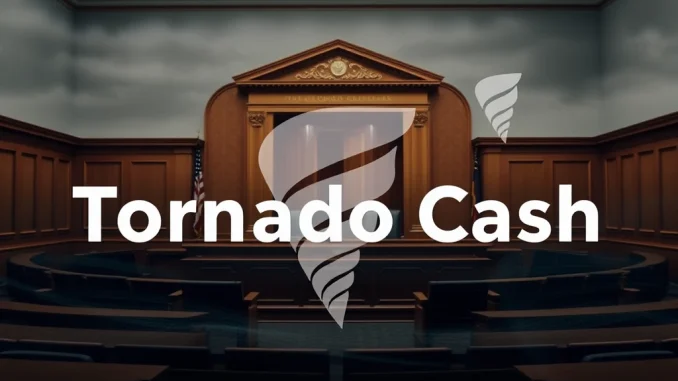
The legal battle surrounding decentralized finance (DeFi) and privacy tools continues to intensify. At the heart of a significant crypto legal case is Roman Storm, a co-founder of the controversial crypto mixing service, Tornado Cash. Storm faces serious charges from the U.S. Department of Justice (DOJ), including sanctions evasion, unlicensed money transmission, and money laundering. However, a dramatic turn has emerged: Storm’s defense team alleges the DOJ has withheld crucial evidence favorable to their client.
Allegations of Withheld DOJ Evidence Surface
According to reports, Storm’s attorneys recently informed the court that they discovered the government had been in possession of exculpatory materials – evidence that could potentially favor the defense – since August 2023. This is a significant claim, as the defense argues the DOJ’s failure to disclose these materials earlier, specifically before Storm’s indictment and initial court appearances, constitutes a violation of legal procedure.
The defense contends this delay has seriously hampered their ability to prepare and present an effective defense. The core of their argument hinges on what’s known as a Brady violation, a legal term referring to the prosecution’s suppression of evidence favorable to the accused upon request.
What is a Brady Violation?
In simple terms, the U.S. legal system requires prosecutors to maintain a fair process. A key part of this is the ‘Brady rule,’ stemming from the Supreme Court case Brady v. Maryland (1963). This rule mandates that prosecutors must disclose evidence favorable to the defense, especially if that evidence is material to either guilt or punishment. Failure to do so can be grounds for overturning a conviction.
For Storm’s defense team, the alleged withheld DOJ evidence is not just procedural oversight; they view it as a fundamental undermining of Storm’s rights and his ability to mount a proper defense in the face of serious sanctions charges and money laundering accusations.
The Context: Tornado Cash and Sanctions Charges
Tornado Cash is a decentralized protocol designed to mix cryptocurrency funds from various users to obscure their origin and destination, enhancing privacy. While proponents argue this is a vital privacy tool, regulators, including the U.S. Treasury Department, sanctioned the service in 2022, alleging it was used extensively by malicious actors, including state-sponsored hacking groups like North Korea’s Lazarus Group, to launder illicit funds.
Roman Storm, along with co-founder Roman Semenov (who was also indicted but remains at large), is accused of developing, promoting, and operating Tornado Cash as an unlicensed money transmitter and of conspiring to violate sanctions by facilitating transactions for sanctioned entities.
The defense for Storm has consistently argued that Tornado Cash is a piece of software, not a financial service, and that the developers did not control the protocol once deployed. This Roman Storm trial is seen by many in the crypto community as a test case that could set a precedent for developer liability in decentralized systems.
Implications for the Crypto Legal Landscape
The outcome of this crypto legal case has significant implications. If the defense’s claim of a Brady violation is substantiated and deemed material by the court, it could potentially lead to sanctions against the prosecution, impact the admissibility of certain evidence, or even result in the dismissal of charges, though the latter is less common in such cases.
Beyond the immediate trial, this situation highlights the intense scrutiny and legal challenges facing developers of decentralized privacy tools. The tension between privacy concerns and regulatory demands for transparency and control is at the forefront of this case. The alleged withholding of DOJ evidence adds another layer of complexity and controversy to an already high-stakes legal battle for Tornado Cash and its developers.
Summary
The legal proceedings against Tornado Cash co-founder Roman Storm have taken a critical turn with the defense’s accusation that the DOJ withheld favorable evidence. This claim of a Brady violation introduces a serious challenge to the prosecution’s case, potentially impacting the trajectory of the Roman Storm trial. As the court evaluates the validity and materiality of this alleged failure to disclose DOJ evidence, the broader crypto legal case continues to unfold, watched closely by the industry for its potential impact on decentralized technology and the developers behind it, particularly concerning sanctions charges and regulatory enforcement.



